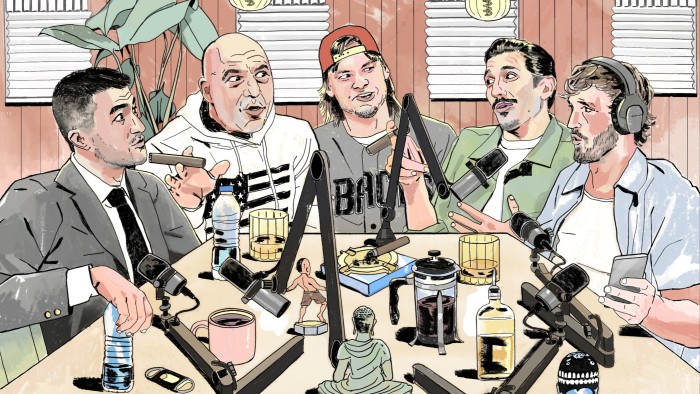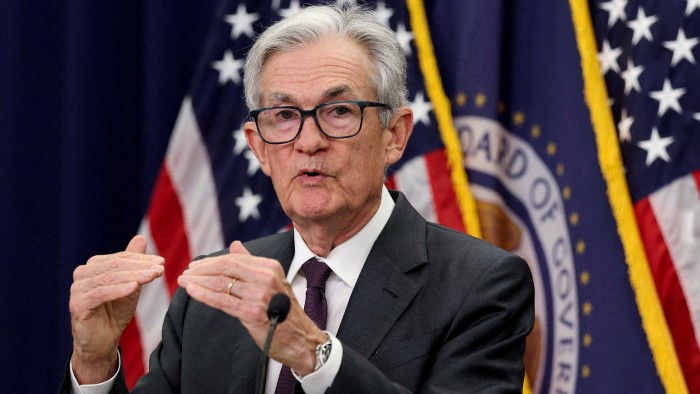[adrotate group="2"]
When Donald Trump reclaimed the White House in November, his team celebrated and delivered victory speeches, acknowledging several key figures. UFC CEO Dana White took the stage and enthusiastically thanked a list of influencers including the Nelk Boys, Adin Ross, Theo Von, Bussin’ with the Boys, and the influential Joe Rogan, as the crowd cheered.
For many Americans, these names may have been unfamiliar; for others, they represent popular figures in modern media. As Trump campaigned for reelection, he notably skipped CBS’s 60 Minutes, breaking a longstanding tradition. Instead, he devoted approximately 17 hours—around 1,000 minutes—talking to a group of podcasters who have emerged as significant new media figures. This ensemble, which revolves around the immense popularity of Joe Rogan, has been referred to as a “manosphere,” reflecting its influence over young American men.
Rogan, Von, and members of the Nelk Boys attended Trump’s inauguration celebrations recently. During the ceremony in the US Capitol rotunda, Rogan was present among tech moguls and former presidents like Barack Obama and George W. Bush, as Trump took his oath. Influencers Jake and Logan Paul added a prank element by causing Von to topple from his seat during Trump’s address. Later that evening, at the Starlight Ball, the star-studded group mingled with crypto entrepreneurs and celebrities such as Linda Yaccarino, Megyn Kelly, and Caitlyn Jenner, with Jake Paul famously carrying Mike Tyson on his shoulders.
Their presence at these significant political events signals the ascent of this “manosphere” to the forefront of American political life and the ongoing transformation of the media landscape. While the formats of podcasts and YouTube have existed for years, today’s shifts are fueled by niche communities, allowing audiences to tailor their media consumption in unprecedented ways.
As Gabriel Kahn, a media professor at the University of Southern California, points out, this change signals “a radical reordering of trust and credibility in media.” Traditional media, once a singular public space, is now splintered into numerous specialized groups, often organized by specific interests or affiliations. This fragmentation has created a broad and concealed media sphere, where today’s podcast talents can attain fame comparable to that of traditional celebrities yet remain largely unknown to older generations.
The recent US election highlighted this trend, especially with the influx of podcasters seen within the halls of Washington, D.C. This deviation raises questions about the future of traditional media entities that have dominated for decades and the extent of their influence in the coming years.
In contrast to conventional media figures, these new podcast stars are characterized by their accessibility. They engage with audiences during mundane activities like doing chores or daily commutes, producing hours of content regularly. The informal nature of their shows fosters a closer connection with listeners. As Scott Galloway, a host of the Pivot podcast, notes, these influencers resonate with audiences as relatable figures, tapping into a vast, underserved demographic.
Stylistically, the “manosphere” often diverges sharply from the conventions of traditional media. While journalists focus on brevity and polished presentation, the new podcasters typically engage in longer, free-flowing conversations. Such shows allow for more genuine discussion and relatability, offering a stark alternative to the slick production of television news.
Lauren Jarvis, a former Spotify executive, emphasizes that audiences are weary of superficial headlines and seek more in-depth discussions. These podcasters often express their personal views and opinions, making their content resonate more deeply with listeners. They generally do not adhere to the rigorous fact-checking standards expected of traditional journalism, resulting in a format that prioritizes authenticity over accuracy.
The lengthy format of podcasts allows hosts to show vulnerability and maintain lower production costs compared to traditional networks. With minimal staff required to run successful podcasts, the financial barriers to entry are significantly lower, leading to substantial profit margins for popular shows.
Meanwhile, traditional media has begun responding to the rise of podcasting, particularly within right-leaning politics. Fox News recently adjusted its programming to adopt a more podcast-oriented style, hinting at an awareness of changing viewer preferences.
As these dynamics play out, the coexistence of old and new media seems possible. While podcasters enjoyed prominent placements at Trump’s inauguration, traditional media figures still hold significant influence, as demonstrated by Trump’s numerous hires from Fox News.
Key figures in the podcasting realm include Theo Von, Joe Rogan, Lex Fridman, Andrew Schulz, and Logan Paul, each bringing their unique style and audience engagement to the forefront of new media. As this landscape evolves, the balance between traditional and emerging media platforms continues to be redefined, with substantial implications for the future of communication and influence in America.
photo credit: www.ft.com
[adrotate group="2"]





